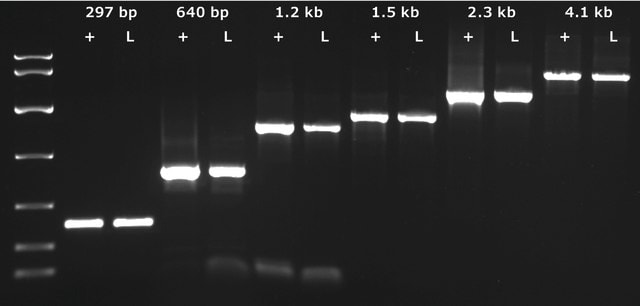2GFHSRMKB
Roche
KAPA2G Fast HotStart ReadyMix
2 ×
Synonym(s):
PCR, hotstart PCR
About This Item
Recommended Products
usage
sufficient for 100 reactions
sufficient for 500 reactions
Quality Level
shelf life
≤18 mo.
feature
Fast PCR
Multiplex PCR
dNTPs included
hotstart
packaging
kit of 1.25 mL (100 x 25 μL rxn; KK5603)
kit of 6.25 mL (500 x 25 μL rxn; KK5601)
manufacturer/tradename
Roche
concentration
2 ×
technique(s)
PCR: suitable
input
purified DNA
storage temp.
−20°C
Looking for similar products? Visit Product Comparison Guide
General description
KAPA2G Fast DNA Polymerase Kits are designed for fast PCR, in which total reaction times are 20–70% shorter than those of conventional PCR assays performed with wild-type Taq DNA polymerase. This can be achieved without sacrificing reaction performance, and does not require specialized PCR consumables or thermocyclers.
KAPA2G Fast HotStart® DNA Polymerase is supplied in a convenient 2X ReadyMix format, containing all reaction components except primers and template.
Application
- Routine PCR
- Fast PCR
- Reverse transcription polymerase chain reaction (RT-PCR)
- Genotyping and fluorescent PCR
Biochem/physiol Actions
Features and Benefits
- Extension times as low as 1 sec per kilobase
- Broad coverage of both AT- and GC-rich targets
High speed, higher performance :
- Single copy sensitivity from complex targets
- Increased yields
Quick Notes :
- KAPA2G Fast HotStart ReadyMix PCR Kits contain the engineered KAPA2G Fast HotStart DNA Polymerase, developed for fast PCR.
- Use 1 sec extension time for amplicons <1 kb and 15 sec/kb for longer amplicons, and save 20–70% of total reaction time.
- No need for specialized instrumentation or PCR consumables.
- Optimized buffer system offers improved yields, specificity and sensitivity, facilitating efficient primer annealing across a wide range of primer lengths, GC contents, and melting temperatures.
- For high reaction efficiency, do not exceed 25 μL reaction volumes.
- KAPA2G Fast HotStart ReadyMix contains 1.5 mM MgCl2 at 1X.
- KAPA2G Fast HotStart ReadyMix with dye includes two inert tracking dyes to allow direct loading onto agarose gels.Reaction products are 3′-dA-tailed and may be cloned into TA cloning vectors.
Quality
Preparation Note
Other Notes
Legal Information
Kit Components Only
- KAPA2G Fast HotStart® DNA Polymerase 0.5 U per 25 µL reaction
- MgCl2 1.5mM at 1X
- dNTP Mix 0.2 mM of each dNTP at 1X
Signal Word
Warning
Hazard Statements
Precautionary Statements
Hazard Classifications
STOT SE 2
Storage Class Code
12 - Non Combustible Liquids
WGK
WGK 1
Flash Point(F)
does not flash
Flash Point(C)
does not flash
Certificates of Analysis (COA)
Search for Certificates of Analysis (COA) by entering the products Lot/Batch Number. Lot and Batch Numbers can be found on a product’s label following the words ‘Lot’ or ‘Batch’.
Already Own This Product?
Find documentation for the products that you have recently purchased in the Document Library.
Customers Also Viewed
Our team of scientists has experience in all areas of research including Life Science, Material Science, Chemical Synthesis, Chromatography, Analytical and many others.
Contact Technical Service






